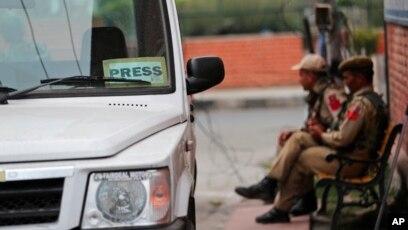Lawsuits, killings and intimidation of journalists in India are contributing to the country faring poorly in the eyes of media watchdogs.
In its latest report, Reporters Without Borders (RSF) noted that India was on a par with Yemen for the number of journalists killed in relation to their work in 2021.
The head of RSF's Asia-Pacific desk, Daniel Bastard, told VOA it was part of a "longtime trend."
Four journalists were killed in 2021, making India the third-most deadly country. But, says Bastard, in the past five years at least 18 journalists have been killed.
"In many cases, Indian journalists are generally the victims of targeted murders after trying to cover local organized crime activities, like trafficking in alcohol, illegal gambling or the exercise of illegal medicine through fake clinics," Bastard said.
India's media have also seen a growing trend of judicial harassment and intimidation against those who do not toe the line of the ruling Bharatiya Janata Party (BJP) party, Bastard believes.
"Censorship and self-censorship have grown steadily in the past few years," Bastard said.
India has rejected RSF's findings.
In a written reply to parliament's lower house, Minister of Information and Broadcasting Anurag Thakur said that the government did not agree with the watchdog's conclusions and that RSF used a small sample size, did not weigh "fundamentals of democracy" or provide a "clear definition of press freedom."
VOA sent emails to the Ministry of Information requesting comment but as of publication had not received a response. The BJP did not reply to emails sent to its spokesperson's office requesting comment.
Common accusations against reporters include sedition or anti-state charges, with media rights groups saying the charges are often related to coverage deemed critical of Prime Minister Narendra Modi's party or policies.

In November alone, the official body the Press Council of India registered 51 complaints filed against the media, including accusations of false or defamatory news. It also received 13 complaints from journalists that their rights had been curtailed.
Digital fight
Social media is also coming under pressure from the government, with thousands of takedown requests filed to Twitter. Most requests were related to critical reporting or satire about the Modi administration, a media researcher found.
Paroma Soni, a data journalist from Mumbai who is currently in New York as a Columbia Journalism Review fellow, found that in 2020, the Indian government asked Twitter to remove nearly 10,000 tweets, up from about 1,200 the prior year.
The journalist acknowledged that the data has some limitations, including what she said was a lack of transparency from the government. But she told VOA her investigation "reveals thousands of legal orders, given to Twitter by the government, to remove critical tweets, some of which are the basis for the arrests or legal proceedings as well."
New legislation and guidelines on digital and social media have made it easier for the state to control online speech, Soni said.
Indian Government in Standoff with Twitter Over Online Speech
Laws meant to address offensive social media posts are being used to remove reporting from online news websites, with little to no recourse for those affected, Soni said.
In the past few years, India has seen a sharp increase in the number of journalists formally or informally targeted for their work, she added.
"The police, acting at the behest of the government, has been known to intimidate and arrest journalists whose work has been critical of the government, deemed 'anti-national' or generally negative towards Hindutva ideology," Soni said.
Recently, Assam-based journalist Anirban Roy Choudhury, who owns the news website Barak Bulletin, was charged with sedition after publishing an editorial that authorities deemed "objectionable."
The charge is related to a November 28 editorial opposing authorities imposing Assamese in the Barak Valley. Issues of language and identity have long been a sensitive topic in the area, which is populated by Assamese and Bengalis.
Sedition cases have gone up by a third since the BJP came to power, Soni said.
"I think what's more alarming is that the battle is not just between the government and the media that criticize it; it is also about how public opinion is shaped. The BJP is in power on a Hindu nationalist platform, but the vast majority of India prescribes to those ideologies as well," Soni said.
As well as lawsuits and attacks, "this manifests perhaps as harassment and threats made by online trolls," she said.
The impact of such an environment is self-censorship, said Pushparaj Deshpande, series editor of Rethinking India. The 14-volume series on socioeconomics and policy is published by Penguin India and the Samruddha Bharat Foundation, an organization set up to promote progressive ideas and policy.
"A vast majority of media houses are coerced into submission. Editors are subtly forced to self-censor, journalists are denied access to legislatures or incarcerated on spurious cases for demanding accountability from governments," Deshpande said. "Frankly, freedom of press in India has become a constitutional value more honored in the breach than its observance."
Global issue
However, Nayanima Basu, the diplomacy editor at ThePrint, believes the experiences of India's media are being reflected globally.
"Press freedom has been under threat in every democracy ever since media became the fourth pillar of democracy. It is only aggravating now and getting more visible due to emergence of social media," Basu said.
"Every populist government believes in curbing press freedom and perpetuating propaganda. Having said that, it is true that journalists today need to be firm and perfect in verification of facts and not indulge in theatrics. Do reporting, do journalism, not activism or advertisement," she added.
Editor's note: The reporter for this article has previously contributed to RSF but was not involved in research for report cited in this piece.




